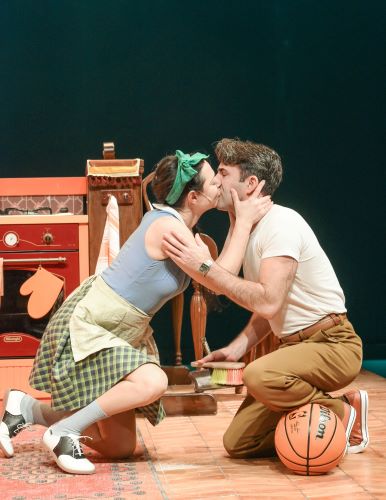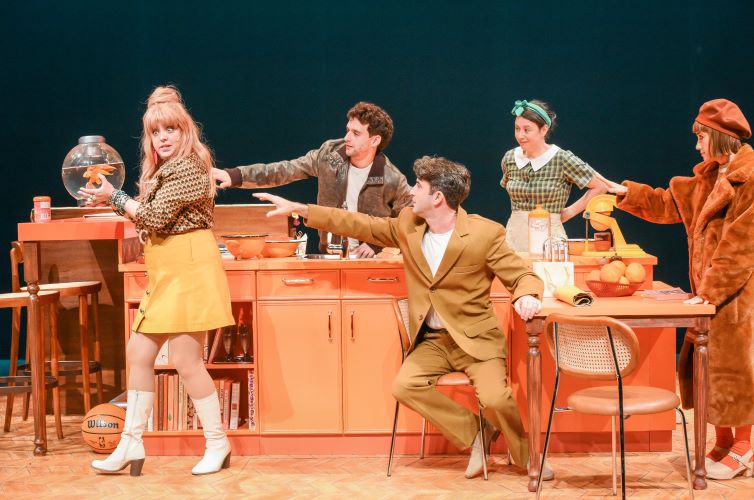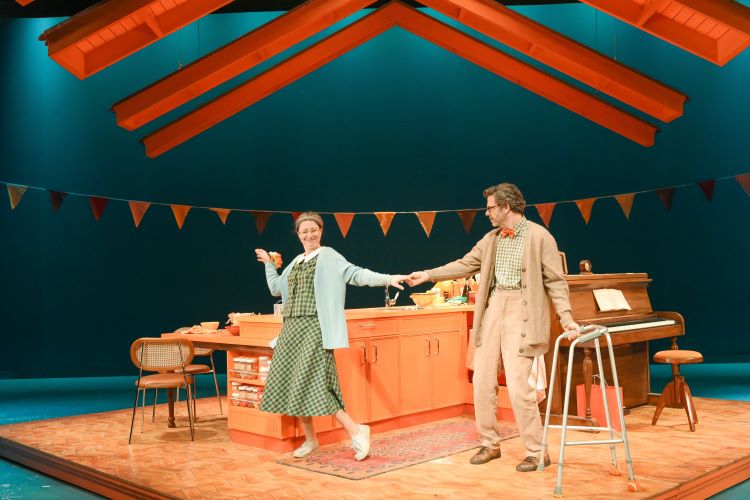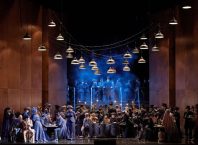Ola Schur Selektar shines in a magnificent performance in Birthday Candles, directed by Roni Brodecki at the Cameri Theatre. Written by Noah Haidle, the play is performed in a lively translation to Hebrew by Eli Bijaoui and revolves – in more ways than one – around the baking of a birthday cake. Just as in the recipe for butter cake, passed on from one generation to the next, the simple ingredients – butter, sugar, eggs and flour, combine to make something delicious, the different elements of the play come together to create a moving and magical experience.

The play opens as Alice (Kineret Limoni) is baking a cake for her daughter Ernestine’s (Ola Schur Selektar) 17th birthday, saying it’s time Ernestine learns how to bake the cake, which is their family birthday tradition. Selektar is bursting with energy and teen angst, her hair in a long braid down her back, and limbs light and nimble. She dreams big, and worries, asking her mother, “Have I wasted my life?” Jumping from one thought to another, she’s also thinking about her upcoming role as Queen Lear in a feminist version of Shakespeare’s play. As she runs lines with her mother, her transformation into an old, infirm Lear is astounding. In an instant, her voice, expression, stature, and gestures are transformed to those of a “foolish fond old man.” It’s a moment that makes one catch one’s breath with its intimation of mortality, a vivid memento mori. It’s also a hint of what is to come as the play follows Ernestine over the next 90 years, always on her birthday.
The set design and lighting are brilliant – a kitchen island stands on a square platform in the center of the stage, with red roof beams suspended over it. It’s a vision that conveys a sense of home without being insistently realistic, and therefore leaves room for imagination and associations. The kitchen is well lit, yet the rest of the stage surrounding the platform is an empty black box bathed in blue light. The kitchen and the life within it exist in isolation, its physical presence corresponding to the play’s content. Although it is concerned with the passage of time, there is a sense of timelessness in the play – there are hardly any markers that set it in a particular country or era. As Ernestine goes from 17 to 18, to her 30s and 50s and onward, that central stage revolves, one literally sees time going by. Ernestine’s question to her mother is also universal and timeless, a question that persists throughout the history of humanity: what is a life well spent?

An excellent cast portrays the people in Ernestine’s life, often taking on more than one role over the course of the play. Although at 18 Ernestine is not really looking for love – she has grander plans – she has two aspiring suitors. Sweet and slightly nerdy Kenneth (Yishay Golan), whose adoration of Ernestine is so deep it almost hurts to watch him, and handsome, oh-so-cool Matt (Eran Mor) in his muscle T. Guess who she falls for? As time goes on, Ernestine’s family grows. Her son Billy (Alon Sendler) plays the piano and like his mother at the same age, “rebels against the universe.” Her daughter Madeline (Naama Chetrit) studies at the university and has a complex inner life. The family grows in other ways as Ernestine acquires a daughter-in-law, the bubbly and slightly nervous Joan – delightfully portrayed by Kineret Limoni. Time brings losses as well. The play is very honest and direct about the pain of losing a loved one, a pain that endures. Yet the staging seems somehow intended to soften the blow. When a character dies, that actor leaves the central platform for the blue abyss, accompanied by a musical refrain. This staging felt like an attempt to make this passing into a thing of beauty, part of the natural rhythms of nature. Yet I felt that the contrast between the stylized signifying of death and the realistic dialogue and interactions of the play was too great.
The role of Ernestine is a challenging one. Selektar is onstage throughout the entire play, maturing and aging before our eyes. Without props, elaborate wigs or costume changes, her voice, stance, movement, and demeanor subtly shift from scene to scene. Yet the flow of these transitions is so smooth that it is almost imperceptible, and Selektar embodies each age so deeply and completely that watching her in any given scene feels so true and natural, as if Ernestine has always been 30 or 50 or 90, and had not been, just a few minutes before, a girl of 17. It’s an amazing feat, taking a character through so many changes. Selektar delivers a stellar performance with such grace, ease, and lightness that it takes one’s breath away.

There is a lot of action in the play, yet in covering 90 years in Ernestine’s life there is not much time to linger and ponder characters and events in depth. Yet as we meet Ernestine time and again on her birthday, and she contends with the changes in her life, there is a strong sense of the importance of traditions, and the way those traditions create a bond between people. The emotional landscape of the play is one that places an emphasis on compassion, and sensitive performances by the entire cast invite the viewer to take Ernestine, her friends and family into our hearts as well.
Birthday Candles
By Noah Haidle
Translation by Eli Bijaoui; Director: Roni Brodecki; Set Design: Shani Tur; Costume Design: Shira Wise; Music: Maya Belsitzman; Lighting Design: Keren Granek; Movement: Sharon Gal; Cast: Ola Schur Selektar (Ernestine Ashworth), Yishay Golan (Kenneth), Eran Mor (Matt, William), Kineret Limoni (Alice, Joan, Alex), Naama Chetrit (Madeline, Ernie, Beth), Alon Sendler (Billy, John)





